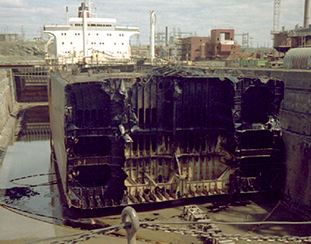|
Find Out About Structural Integrity and Failure
 An Introduction to Structural Integrity
An Introduction to Structural Integrity
Structural Integrity is the ability of a component, structure or asset to operate at optimum level under the pressure of a load, including the weight of the asset itself. The asset needs to sustain without drastically breaking and/or deforming, whilst still being able to perform its intended use. Structural integrity is a vital consideration for structural engineering, especially when constructing plant and equipment, due to the risk of catastrophic failure from which recovery is not possible.
Structural Failure
Structural failure is the result of a loss of structural integrity. It is caused when a component, structure or asset is put under too much pressure, thereby reaching its strength limit, and causing it to deform or break. Therefore, a significant factor during the design process is to ensure that, if it collapses or fails, the failure can be contained to make sure the structure does not immediately collapse or completely collapse in the future. It is therefore important for structural integrity management to be maintained and regularly carried out.
Types of Structural Failure
Structural failure can be caused by many factors, so structural integrity management is central to understanding how to mitigate and prevent catastrophic failure from occurring.
Human errors within planning can be a cause for structural failure, particularly in relation to miscalculation of data. Structural engineers must take into consideration the factors of fatigue and the structure/component’s ability to withstand the continuous loading and unloading of pressure and/or weight. Fatigue itself is a result of environmental factors including corrosion, which usually occurs where cracks appear at a stress point when the structure/component reaches its maximum stress capacity. Fracture Mechanics looks at the presence of cracks in a structure/component and has become the basis of structural integrity assessment.
Other considerations include the size and shape of the asset, especially due to its needing to hold its own weight and the weight that it will be exposed to. The materials used to construct the asset can be a cause of structural failure. It is particularly important to carry out structural inspections when older buildings are being used for new purposes, due to the suitability of the materials that the structure/component was originally constructed from, as different materials can withstand different loads.
Other factors that are more difficult to manage, and therefore cannot be predicted, include vandalism, intended destruction and natural disasters.
Find out more about what the causes of structural failure are.
Why Structural Integrity is Important in Today’s Society
Structural integrity is a very significant consideration for structural engineering and is mandatory for engineers to carry out due to the assets they construct being used for both industrial and social purposes. Structures and components constructed for societal use are subjected to evaluation and structural inspection by government agencies. Structural integrity, as a relatively modern concept, has many benefits in modern day society, the main one being that its mandatory implementation leads to a higher standard of safety being upheld. Governmental evaluations are carried out using structural inspection and this process is based on prior failure analysis being undertaken. The concept of structural integrity management continues to become more apparent due to the long term consequences shown in failure analysis reports, including previous bridge and building collapses.
Structural Inspection
Structural inspection is the process of a qualified engineer examining the structural integrity and condition of a structure or component. They assess if the asset is suitable for its intended use and whether it can handle the repeated loads that it will hold. They also assess if the structure can continue to perform the function of its intended use.
- TWI Training and Examination offers a range of global courses related to structural integrity, including structural inspection. The courses are designed to ensure that you can develop your knowledge as an engineer, including your knowledge of inspecting structures and their safety and integrity.
- The Structural Integrity Assessment and Practical Application of BS 7910 Procedures for the Assessment of Flaws in Metallic Structures course looks at managing the integrity of ageing structures and optimising asset performance.
- Other related courses offered by TWI Training and Examinations include structural integrity in regard to a specific field of engineering inspection:
- The Corrosion Detection and Monitoring – Conventional Ultrasonic Inspection (UV) course looks at corrosion and its significance in impacting structures and components.
- The CSWIP Plant Inspector Levels 2/3 Module 2: Damage Assessment for RBI and FFS, based on API RP 571 course looks at the integrity of ageing process equipment, pipelines, boilers and storage tanks.
- The Appreciation of Advanced NDT Techniques course looks at the integrity of ageing process equipment using NDT.
Membership of The Welding Institute
As a structural integrity engineer, The Welding Institute can support your professional development, with help and guidance from our volunteer mentors. Membership of The Welding Institute is a great opportunity for you to demonstrate your competence as an engineer.
As a Member of The Welding Institute you qualify for a 5% discount on TWI Training and Examination courses. Click here to see all of the Membership Benefits.
The Welding Institute also organises Technical Group Meetings (TGM) including the Structural Integrity TGM where Members meet and discuss the latest developments in the practice and the technology of their specialist area. They are an excellent opportunity for you to network with people and gain important contacts that could aid your career development. Click here to see all of our events.
